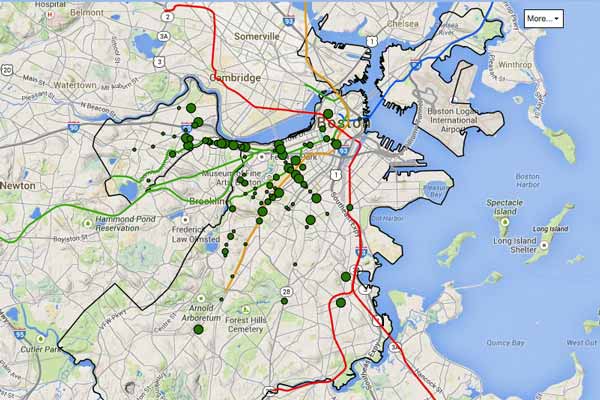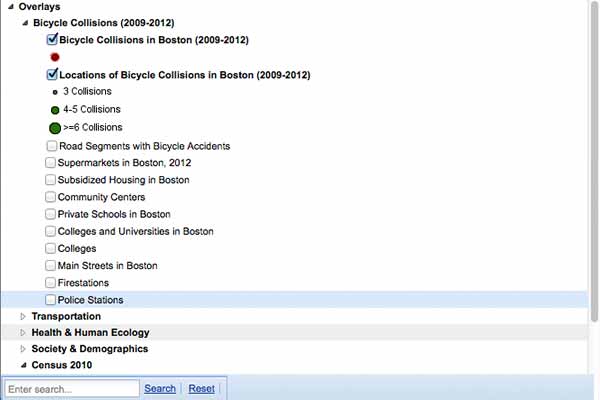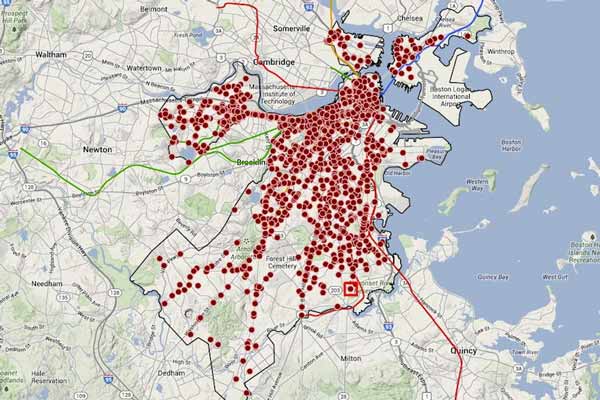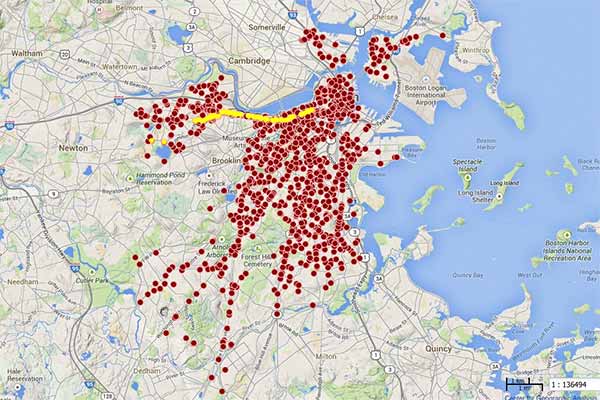 Bicycle Crash Hotspots
Bicycle Crash Hotspots
Many bicyclists suffer serious injury and incur significant medical and financial losses resulting from bicycle accidents. If a bicyclist suffers injury as a result of an accident involving a car, the bicyclist, regardless of fault, can have some of his medical bills and lost wages paid under the car’s insurance policy. To read more about recovering for your bicycle accident-related medical bills see this article: PIP Insurance. Additional recoveries may also be available against at fault cars.
In an effort to make bicycling safer in and around Boston, the Harvard School of Public Health’s Injury Control Research Center provides our city representatives with resources to evaluate the dangerousness of specific locations in or around Boston. Moreover, bicyclists can evaluate the dangerousness of traveling certain routes in Boston? If you ride a bike in or around Boston, you should see this interactive map developed by the Boston Area Research Initiative (BARI).
The first view of the map shown above displays locations where there are at least three (3) bicycle collisions.
The panel on the left of the map (shown below) provides a number of overlays with information regarding individual bicycle collisions. Checking the box that indicates the Bicycle Collisions in Boston (2009-2012) red dots the location of each accident.
At the bottom of the left panel you can search the name of specific streets (such as “Commonwealth”) and all the accidents on that street turn from a red dot to a yellow dot.
For detailed information about these accidents, including, but not limited to specific location, weather conditions and the cyclist’s demographics, click on an accident spot.
The credit for this research goes to Dahianna Lopez, a doctoral student at Harvard’s Injury Control Research Center. While completing a BARI fellowship, she collaborated with the Boston Police Department (BPD), the Harvard School of Public Health’s Injury Control Research Center, and the Boston Cyclists Union to produce the database that covers all bicycle collisions between 2009 and 2012.
How Bike Law Impacts Bicyclists and Motorists
The laws cover bicyclists, bikes and motorists. Two frequent causes of accidents are “dooring” and making quick right turns shortly after passing a bike rider. “Dooring” occurs when drivers or their passengers open the car door without checking to see if bicyclists are passing or about to pass causing the bicyclist to crash into the opening door.
The following are a few of the laws regarding some issues relevant to avoiding bicycle accidents:
Do Not Cut-off After Passing: M.G.L. c. 89, § 2 requires that motorists who pass a bicycle traveling in the same direction cannot change lanes cutting off the bicyclist until the motorist has safely overtaken the bicycle.
Do Not Squeeze Bikes in a Narrow Lane: M.G.L. c. 89, § 2 requires motorists to wait until it is safe to pass in a lane shared with a bicycle.
Do Not Make an Abrupt Turn After Passing: M.G.L. c. 90, § 14 prohibits motorists from turning after passing a bicycle unless the turn can be made at a reasonable and proper speed as well as at a safe distance from a bicyclist.
Watch for Bicyclists on Your Right: Bicycles can legally ride to the right of motor vehicle traffic. A bicycle riding to the right of traffic is not a defense for a motorist causing a crash with a bicycle. (M.G.L. c. 85, § 11B).
To familiarize yourself with the complete law regarding bikes in Massachusetts go to this link: http://massbike.org/resourcesnew/bike-law/.
If you have suffered an injury resulting from a bicycle accident, you should consult a competent, experienced personal injury lawyer to understand your rights.
Source Articles:
http://www.bostonarearesearchinitiative.net/news-and-events.php
http://massbike.org/resourcesnew/bike-law/
Photo source:
Bicycle Collisions in Boston (2009-2012)
http://worldmap.harvard.edu/maps/3832
Boston Research Map Creative Commons License CC BY-NC-SA (Attribution-NonCommercial-ShareAlike)
This instance of BostonMap illustrates patterns in bicycle collisions across Boston, MA between 2009 and 2012. The data are derived from Boston Police Department (BPD) incident narrative reports, as organized and compiled by Dahianna Lopez (Harvard Injury Control and Research Center) and partners at BPD, BARI and the Boston Cyclists Union. Visitors can also download the raw data, including narrative reports, and documentation at the BARI Data Library.
The Boston Research Map
Boston Research Map is an open source web mapping system that is an ongoing project of the Boston Area Research Initiative (BARI) in conjunction with the WorldMap team. It is intended to help faculty and their students, policymakers and practitioners, and community members to explore the neighborhoods of Boston from their computer. Visitors to BostonMap can:
1. Interact with the best available public data for the Boston region, while also uploading their own data.
2. See the whole Boston area but also zoom in to particular places.
3. Accumulate both contemporary and historical data supplied by researchers and make it permanently accessible online.
4. Work collaboratively across disciplines and organizations with spatial information in an online environment.
Note: The above map is interactive, but does not have all the functionality of the original map website for Boston bike collisions.




